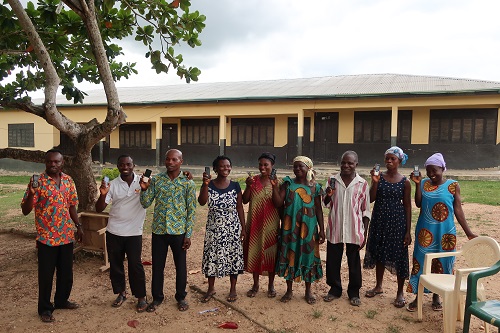Samuel has been a cocoa farmer for 12 years. Since the end of the Akuafo cheque system, he had always been paid in cash for his cocoa, until last season. That was when the licensed buying company (LBC) that he sells to introduced a new system for purchasing cocoa. Now, when he brings his cocoa to the purchasing clerk and it is weighed, the clerk uses a new payment system to send money directly from the LBC’s bank to Samuel’s mobile phone.
Although he was initially skeptical about the new system, Samuel has been won over. He likes the convenience: “Mobile money is more manageable. My children are spread around at different schools. When they call and need money, because I have it on my phone, I can immediately forward it to them.”
He also likes the security. Purchasing clerks usually carry large sums of cash and are targets for robbery. Samuel’s purchasing clerk was recently attacked but, as he did not have a cedi on his person, escaped unharmed. And most of all, Samuel likes having his money stored away. “If it is on the [electronic mobile] wallet, you don’t just withdraw it to use. But if the cash is with you, it just goes!”
Ghana is among the world’s leaders in the use of mobile money, but shockingly, the cocoa sector still pays upwards of GH¢7 billion (US$1.2 billion) every year in cash and checks to purchasing clerks, who then transfer it to farmers in cash.
This means over 90% of the farmer transactions are still made in cash. Our organizations have released today new analysis showing that the costs and risk of cash to the cocoa sector are valued at more than $20 million every year, or more than 20% of turnover for all LBCs.
Bank interest charges borne by LBCs during the cocoa purchasing cycle are high and the process can last up to 60 days. Cocoa farmers struggle to access credit and grow their yields. Only one in eight cocoa farmers has purchased inputs with a formal loan.
For banks and digital lenders, the reason is simple: it is too hard to reach cocoa farmers and too difficult to assess their ability to pay. One out of every four lives on less than GH¢18 a day. Moreover, purchasing clerks and district staff live under the threat of armed robbery because they carry big amounts of cash around.
The cocoa sector is critical for Ghana’s economy. It employs 2 million people and contributes to 19% of all exports. Digital payments can help make the sector more efficient, transparent, and secure for companies and people alike.
With digital payments, instead of giving cash to purchasing clerks, LBCs can transfer money directly to farmers’ wallets the moment a purchasing clerk digitally records the receipt of their cocoa. This can reduce the LBC’s interest costs by 10% or more. The ability to track their money all the way to the farmer cuts down the opportunities for theft or the misuse of funds. The move towards digital payments can make it easier for local banks and microfinance institutions to lend to farmers by creating digital, analyzable records.
The good news is that change is already happening. The Ghana Cocoa Board (COCOBOD) has encouraged LBCs to start paying their farmers digitally. Several LBCs have begun doing so, and as a result, have seen interest savings and fewer robberies.
The responsible digitization of payments across the agricultural sector is one of the key areas the government wants to focus on in its Cash-Lite Roadmap. This policy initiative, recently launched, calls on key public and private sector players to work together to accelerate the shift from cash to digital payments, including across the cocoa sector. COCOBOD is leading by example. Soon, all its data collected from and monetary disbursements to farmers will be digital. COCOBOD is also taking steps to enable all premium and cocoa bean payments to farmers are made without cash.
As the COVID-19 pandemic has shown, now more than ever, responsible digital payments are vital to deliver funds quickly to those most in need and help the country be better prepared for future crises.
>>>Betty Annan is Ghana’s Country Director at the World Cocoa Foundation and Oswell Kahonde is the Africa Lead at the United Nations-based Better Than Cash Alliance










